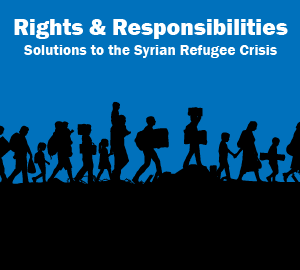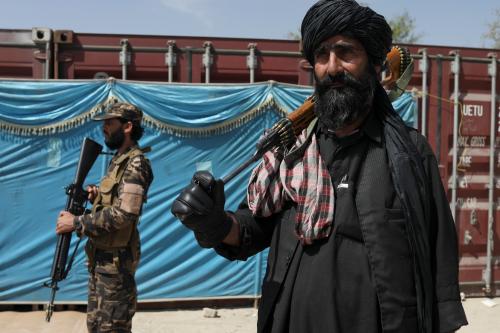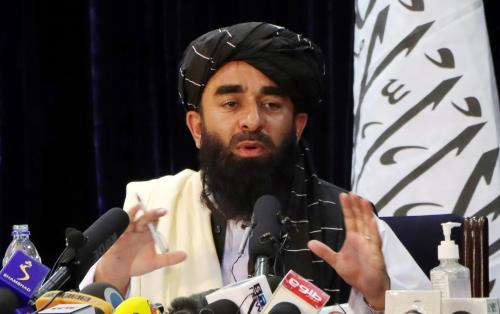 There is no question that the United States and countless other governments in Europe, Asia, and the Middle East can be doing much more to manage the refugee crisis stemming from the Syrian civil war. Building more and better camps. Providing more and better food, medicine and other humanitarian supplies. Establishing more and better security for camps and other refugee communities. Simply admitting more refugees, in both the border states and those far away. These and other steps would do much to alleviate the plight of so many fleeing the horrors of civil war in Syria.
There is no question that the United States and countless other governments in Europe, Asia, and the Middle East can be doing much more to manage the refugee crisis stemming from the Syrian civil war. Building more and better camps. Providing more and better food, medicine and other humanitarian supplies. Establishing more and better security for camps and other refugee communities. Simply admitting more refugees, in both the border states and those far away. These and other steps would do much to alleviate the plight of so many fleeing the horrors of civil war in Syria.
They are all things that we can and should undertake.
But, there are some important “buts” to consider as well. First, while Syria is the worst part by far, it is still only part of the regional refugee crisis. Almost 12 million Syrians have been displaced internally or externally, but so too have 4.2 million Iraqis, 2.2 million Yemenis, and at least 1 million Libyans by their own civil wars. And they join roughly 5 million Palestinians and 4 million Sudanese displaced by earlier conflicts.
Second, even if the international community did 10 times as much to help Syrian (and other Middle Eastern) refugees as it is doing now, it would only be a drop in the bucket. Whether the United States takes in 8,000 or 80,000 refugees, it barely dents the millions. What’s more, as long as these civil wars burn on, they will generate more and more refugees. Even if we somehow found a way to take in all 4 million Syrians who have fled so far, what do we do with the millions more who are likely to flee in the next 5 years?
[A]s long as these civil wars burn on, they will generate more and more refugees.
And that’s not to mention the 400,000 who have already died in Syria since 2011, and the hundreds of thousands more who may die in the next five years of fighting there if the war is allowed to rage on.
If we really want to address the humanitarian crisis being created by the Syrian civil war and stop its dangerous spillover onto Turkey, Jordan, Iraq, Lebanon and Europe, the only way to do so in a meaningful fashion is to end the civil war there.
The problem here is the myth that has taken root that it is not possible for one country to end a civil war in another country. It is. We have done it before—in Bosnia, in Kosovo, and (unfortunately only temporarily) in Iraq. Others have done it in East Timor, Cambodia, Lebanon, and elsewhere. As I have written with the great scholar of civil wars, Barbara Walter, it is entirely possible to lay out a strategy that would allow the United States and its allies to bring a negotiated end to the civil war in Syria (and Iraq, Libya, and possibly Yemen as well).
Of course, doing so will not be quick, easy, or cheap but it does not have to be as ruinously expensive as our Iraq fiasco or as endless as our Afghan fiasco. Indeed, both of those conflicts have gone as badly as they have because the United States has steadfastly refused to apply the lessons of prior civil wars to these conflicts. Unfortunately, we are determinedly repeating the same mistake in Syria, refusing to adopt the one course of action that history has demonstrated can work.
Since 2011, I have repeatedly outlined what a realistic American strategy toward the Syrian civil war would look like based on the historical evidence from 150 civil wars over the past century. I have been helped enormously by the work of a community of scholars on civil wars that for several decades—beginning long before 9/11—has been gleaning this history for its lessons.
[C]ivil wars don’t admit themselves of half-measures.
One of the most important lessons of this scholarship is that civil wars don’t admit themselves of half-measures. There is one approach that third parties have used to end a civil war by peaceful negotiation that has worked not only to end conflicts, but to create the circumstances in which it is less likely that the civil war will flare up again in a few years, as is too often the case otherwise. In the case of Syria, if the West does not want to intervene and occupy the country as we did in Iraq and Bosnia, then the only realistic alternative is to build a (reasonably) capable, conventionally-armed and organized, new Syrian opposition army. When backed by U.S. air power, advisors, intelligence, and logistical support, such a force could defeat Da’esh (the Arabic acronym for the Islamic State), the Nusra Front and all other potential rivals, including the Assad regime if it comes to that, and secure the territory it conquers to enable a new bottom-up political process to take hold.
It sounds hard, and it won’t be easy, but it is far from impossible, and the history of civil wars suggests that it is the only strategy that can actually work. I fear that if we don’t do now what will be hard but can work, then five years from now we will be holding yet another conference on the Syrian refugee crisis, because it will have gotten so bad that managing it will be beyond any policy.


Commentary
The refugee crisis won’t end until the civil wars do
June 14, 2016